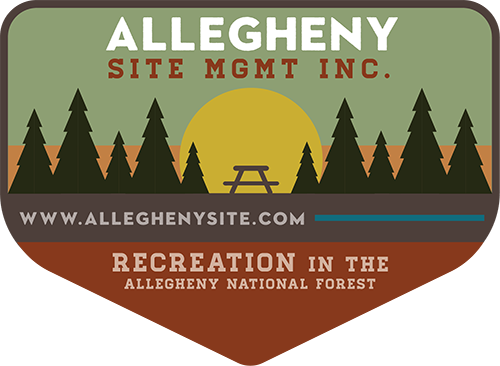Allegheny Site Management (ASM) operates revenue-producing property under a “special use permit” or concession.
We currently hold four separate Special Use Permits that cover 19 recreation areas in the Allegheny National Forest. In these contracts, ASM is responsible for all aspects of managing these areas, generally having camp hosts and camp managers. ASM performs maintenance and cleaning for the area and is responsible for the operating expenses.
ASM is responsible for supplying all necessary equipment and laborers to achieve this. ASM carries all necessary insurances, liability, property, fire, and worker compensation. In return, ASM collects all revenues from the area, paying the government agreed-upon percentage of the revenues as fees. Usually, these contracts will specify the quality standards of the work to be performed, the operating days and hours, the maximum fees, and the agreed-upon revenue share to the government. ASM is also given the option to Granger-Thye the revenues paid to the USDA. This is often the best option for both parties and the public.
ASM is not responsible for structural problems and major improvements. ASM is able to take the revenues, which, would go to the US Treasury and used at their digression and put it back into the Allegheny National Forest’s recreation areas. This in turn keeps the money local and in the forest where it was generated. This also is spent more efficiently by being used by a small business instead of the government.

This nature of contract structure has a number of advantages over typical flat fee or most plus outsourcing contracts:
- Government expenses are capped – since there are none.
- The private operator, such as ASM, can work to improve and enhance both expense levels and revenue generation of the area. In our experience, there is typically much more value to be created for the government in many recreation facilities from revenue enhancement than through productivity.
- The contracts are not subject year-to-year appropriations processes. No money to pay facility expenses or the private contractor has to be budgeted each year.
Frequently Asked Questions About Concessionaires
What is a concessionaire?
We are a privately owned S Corporation that operates recreation facilities, like campgrounds and boat launches for the US Forest Service. This is done through a special use permit, which is given out for a number of years to maintain these areas of operation.
How does a special use permit work?
Special use permits are given out to private companies for a number of years, usually between 5-10 years. Though all the terms vary, in most cases the permit gives the concessionaire the right to operate on and collect revenues from a certain area. In addition, the company is obligated to pay for any operating expenses. Normally, the company pays a fee to have this special use permit.
How are these permits granted?
The government conducts a competitive bid process. Selection criteria could include evaluation of the company’s qualifications, it’s financial situation, it’s operations plans and goals, and the percentage of revenue bid as a return to the government.
Once granted, can the private company do anything it wants with the area?
We operate under a very detailed and organized set of guidelines that identify the condition the facilities must be kept in, the fees to be charged, the provided training, etc. Failure to comply with these requirements and guidelines will cause the concessionaire to lose their special use permit.
Where does the money for camping fees go?
The majority of your fees go to operating expenses for the area, maintenance, equipment, safety patrols, etc. A large portion also goes to the government in fees. Because of efficiencies in private vs. government operation, these fees paid are typically higher than what the government was making running the facility on it’s own. By law, the fees paid to the government stay in the local forest and are used to improvement and new construction.
Don’t my taxes pay for all this anyway? Why do I have to pay extra fees?
Unfortunately, it has been numerous of years since tax money that flows to the US Forest Service was sufficient to provide the funding of operations and the recreation facilities. Recent administrators as well as Congress have decided that organizations similar to the US Forest Service must recover an increasing part of their budget from users directly. The same can be said in most states, as budget crises are constantly threatening to close parks and recreation facilities.

